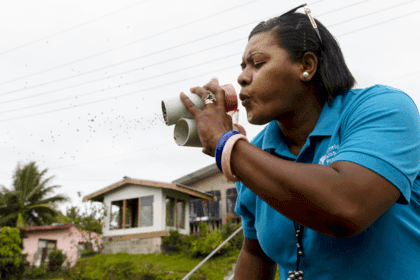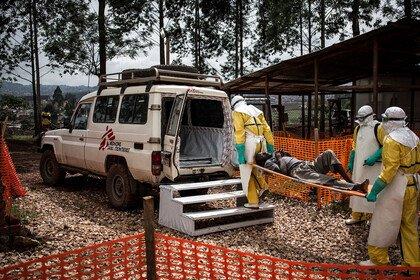
Ebola vaccine: transforming global health responses
Wellcome played a crucial role in the response to the 2014 West African Ebola epidemic. We invested over £10 million to treat, prevent and contain the disease. Now, two licensed vaccines are in use for the Zaire ebolavirus strain, protecting communities at risk during outbreaks.

Alexis Huguet / AFP
In 2014, an epidemic of Ebola virus disease spread across West Africa. Caused by the deadly Zaire ebolavirus strain, this became the biggest and deadliest outbreak of the virus since it was first identified in 1976.
Ebola (Zaire) virus has a high fatality rate of 90% and spreads quickly, making it a severe threat.
Throughout 2014 to 2016, there were over 28,000 suspected cases and 11,000 deaths across West Africa. At that time, no vaccines or treatments were available to combat the disease.
Tackling the Ebola challenge
Overcoming the Ebola outbreak required a multifaceted approach. Vaccine development, public health initiatives and community engagement were all vital.
The UK Government led initiatives in Sierra Leone – where they constructed treatment centres, increased treatment beds and supported burial teams.
Efforts went beyond medical interventions. They included training health workers in community engagement and improving diagnostic tests. Predictive mapping was also used to understand and control disease spread.
This comprehensive response addressed immediate health needs. It strengthened infrastructure and readiness for any future outbreaks.
Wellcome's commitment to vaccine development
Wellcome, alongside other global partners, played a critical role in funding the development of a vaccine for the Zaire ebolavirus strain and bringing this outbreak to a close.
Progress had been slow, with an urgent need for a rapid scientific response. Wellcome provided essential resources, enabling trials of safe and effective vaccines to reach the delivery phase. We also facilitated international cooperation. Knowledge exchange and collaboration between partners were crucial to reaching a solution.
The ERVEBO® vaccine was approved in 2019. Since then, it has been effective in preventing further outbreaks.
The transformative impact of the ERVEBO® vaccine
The introduction of ERVEBO® marked a turning point in the battle against Ebola. The vaccine's efficacy exceeded 95% in trials, and had an overall effectiveness of 84%.
This scientific milestone helped control the spread of the Zaire ebolavirus strain. And it provided a framework for responding to similar future outbreaks.
Rapid intervention and collaboration significantly curbed the disease's spread.
Who benefitted from the ERVEBO® vaccine
The vaccine helped protect at-risk individuals. The communities in West Africa benefitted greatly, particularly in Guinea, Sierra Leone, and Liberia where the outbreaks were widespread.
The vaccine also worked as an extra layer of protection for healthcare workers.
The response to the West African Ebola outbreak highlighted the need for better epidemic preparedness. This led global health groups to enhance response strategies by learning from the experience. WHO created an R&D blueprint, and the Coalition for Epidemic Preparedness Innovation (CEPI) was formed to boost global vaccine development and collaboration.
CEPI, the Coalition for Epidemic Preparedness Innovations, is a global partnership working to accelerate the development of vaccines to contain outbreaks before they become emergencies.
It was formed in response to expert reports into the 2013-16 Ebola outbreak, calling for a new system to stimulate vaccine development based on collective action and partnerships across sectors and countries.
It is supported by over 30 national governments, the European Commission and key philanthropic organisations, including Wellcome.
Policymakers also gained an understanding of the essential infrastructure needed to support scientific breakthroughs. Investing in research during outbreaks is crucial to vaccine development. They also recognised the importance of timely interventions during critical times.
Preparing for future outbreaks
The story of the ERVEBO® vaccine highlights the power of science and collaboration. Wellcome remains committed to working with global partners, sharing knowledge and facilitating partnerships.
While this was a breakthrough for Ebola, this vaccine is only effective against the Zaire strain. There is still more research and innovation needed to protect vulnerable communities against other strains, like the 2025 outbreak caused by the Sudanvirus strain in Uganda.
Preparing for future outbreaks requires boosting vaccine infrastructures and cultivating global research cooperation. It also involves creating policy frameworks that can quickly address new health threats.
Wellcome is committed to supporting research and promoting strategies to effectively fight infectious diseases in the most affected communities.
Timeline
- 2014
Ebola outbreak intensifies across West Africa, sparking a global response to find a vaccine.
- 2015
The WHO leads a ring vaccination trial in Guinea with the support of Wellcome, showing promising results.
- 2016
ERVEBO® vaccine proves to be effective and leads to regulatory approval discussions.
- 2019
The WHO prequalifies the Ebola vaccine ERVEBO®, marking it ready for use in outbreak regions.
- 2020
The vaccine is deployed in outbreak regions. This significantly reduced new cases and prevented future spread.
- 2021
Ongoing surveillance and vaccination efforts continue. Feedback was used to prepare swift responses to potential health crises.
- 2022
Initiatives for vaccine distribution expand, reaching more remote areas.
- 2023 and beyond
Wellcome and its partners focus on further research and development. Efforts continue to improve vaccine accessibility. This is part of a broader global health preparedness strategy.

